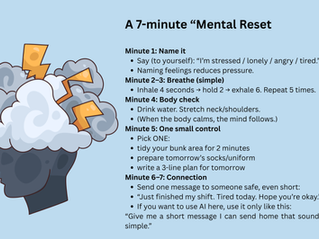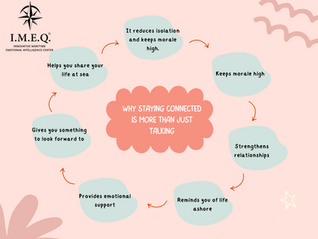Depression and Seafaring: Talking FACTS
- Sep 22, 2023
- 4 min read
Depression and Seafarers: A Review of Published Studies and Facts

The unique work environment of seafarers, characterized by extended periods away from family, physical isolation, demanding schedules, and exposure to potentially traumatic events, predisposes them to a higher risk of mental health issues, particularly depression. This article reviews various studies conducted on this topic and provides an overview of the significant facts related to depression among seafarers.
Studies on Depression Among Seafarers
Mental health and psychological wellbeing of maritime personnel: a systematic review Brooks, S.K., Greenberg, N. Mental health and psychological wellbeing of maritime personnel: a systematic review. BMC Psychol10, 139 (2022):
This study which reviewed Sixty-three studies indicated the below:
Risk factors for poor mental health among seafarers appear to be younger age; being single; poor physical health; exposure to noise/vibration; feeling unsafe; high job demands; long working hours; night/irregular shifts; poor sleep; poor team cohesion; poor perception of management; poor social support; lack of autonomy; scheduling uncertainties; long duration at sea; and over-commitment."
2. ""Seafarers' mental health status and life satisfaction: Structural equation model. Front Public Health. 2022 Nov " This study found that while officers working days per month indirectly impacted satisfaction with life through the general anxiety disorder, perceived health status, depression, anxiety, stress and current mental health. In non-officers, generalized anxiety disorder had the most potent indirect effects on satisfaction with life through perceived health status and current mental health
"Seafarers' mental health status and life satisfaction: Structural equation model. Front Public Health. 2022 Nov "
Key Facts and Findings
High Prevalence: Multiple studies converge on the fact that depression rates among seafarers are higher than the global average. Some studies indicate that more than 20% of seafarers suffer from depression.
Limited Access to Care: The mobile nature of seafaring work makes consistent treatment challenging. Many ships lack the resources to offer proper mental health care, and seafarers may go months without access to professional help.
Stigma and Employment Concerns: There's a prevalent stigma around mental health in the maritime industry. Seafarers often avoid discussing their feelings or seeking help due to concerns about job security.
Lack of Training: While physical health and safety training are standard, mental health training is not universally implemented across ships or maritime companies. This omission exacerbates the issue, leaving crew members and officers ill-equipped to handle or even recognize signs of depression.
Isolation and Connectivity: Modern ships have made strides in providing internet connectivity, but it's still not universal. Being unable to connect with loved ones regularly can intensify feelings of isolation and loneliness.
Factors Exacerbating Depression: Various job-related factors, including strict hierarchies onboard, cultural differences, long contracts, piracy threats, and the inherent dangers of seafaring, can contribute to or exacerbate feelings of depression.
Depression in seafarers can manifest through several symptoms, which can be both emotional and physical:
Emotional Symptoms:
Persistent feelings of sadness or hopelessness
Loss of interest or pleasure in activities once enjoyed
Feelings of worthlessness or excessive guilt
Thoughts of death or suicide
Irritability or frustration
Difficulty in concentrating or making decisions
Physical Symptoms:
Changes in appetite (either decreased appetite or overeating)
Sleep disturbances (insomnia or oversleeping)
Fatigue or loss of energy
Aches or pains, headaches, or digestive problems without a clear physical cause
Slowed speech or movements
Behavioral Symptoms:
Withdrawal from social interactions
Neglect of personal and professional responsibilities
Reduced performance at work
Increased consumption of alcohol or use of drugs
Cognitive Symptoms:
Persistent pessimism or negative outlook
Impaired memory or difficulty remembering things
Indecisiveness
Embracing Isolation: Strategies for Seafarers
Maintain a Routine: A structured daily routine helps instill a sense of normalcy. Allocating specific times for work, exercise, relaxation, and communication can create a balanced day.
Stay Physically Active: The endorphins released during physical activity can combat feelings of sadness. Even simple exercises in confined spaces can help elevate mood and maintain health.
Connect Digitally: Modern ships often have some form of internet connectivity. Regular video calls with family, friends, or even mental health professionals can reduce feelings of isolation.
Develop Onboard Relationships: Building friendships with fellow crew members can create a supportive environment. Group activities, shared meals, and leisure time can foster camaraderie.
Engage in Hobbies: Bring along books, musical instruments, or any other hobby materials. Engaging in creative outlets can be therapeutic.
Seek Professional Help: Some shipping companies provide counseling services for their crew. Do not hesitate to seek assistance if feelings of isolation become overwhelming.
A Career Perspective: Viewing Isolation as an Asset
Gaining Self-awareness: Extended periods of solitude allow for introspection. Seafarers often develop a deeper understanding of themselves, their values, and their aspirations.
Building Resilience: The ability to overcome the challenges of isolation translates to resilience in other areas of life. This skill is invaluable in both personal and professional arenas.
Cultivating Independence: Life at sea teaches self-reliance. Seafarers learn to troubleshoot problems, make decisions independently, and trust their instincts.
Appreciating Connections: Periods of isolation often lead to a profound appreciation for personal connections. Seafarers tend to value their relationships deeply, cherishing moments spent with loved ones.
Career Advancement: Many maritime professionals started their careers with the allure of travel and exploration. Embracing the challenges and rewards of the job can lead to significant career advancement. The maritime industry values experienced seafarers, and opportunities for growth abound for those who persevere.
Conclusion
Depression among seafarers is a pressing issue that requires immediate and comprehensive attention. Recognizing the problem is the first step, but maritime companies, international governing bodies, and individual seafarers must all play a role in creating solutions. Implementing mental health training, providing resources, and reducing the stigma around depression can pave the way for a healthier, happier maritime workforce.
RESOURCES
International Seafarers' Welfare and Assistance Network (ISWAN):
SeafarerHelp: A free, confidential, multilingual helpline for seafarers available 24/7.
Mental health awareness materials and self-help tools available on their website.
2. The Mission to Seafarers:
Offers emotional support through its global network of chaplains.
Provides spaces in ports for seafarers to relax, connect with family, and seek assistance.
3. Sailor's Society - Wellness at Sea:
A program designed to promote mental well-being by addressing the five core aspects of seafarers' lives: Social, Emotional, Physical, Intellectual, and Spiritual.
They also offer a "Wellness at Sea" app which provides self-help tools and resources.
4. The International Maritime Organization (IMO):
While not a direct resource, the IMO has various guidelines and regulations that address seafarers' well-being. Their recognition of the issue encourages shipping companies to adopt best practices.
www.imeq-magazine.com





































































































Extend patience and broaden understanding is needed in dealing relationship among co seamen.